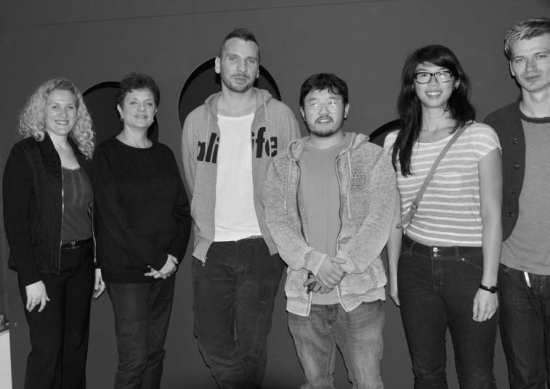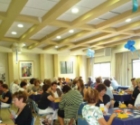
Kinetis aims to swing Israel’s image into a new dimension: from stuffy politics to a trendy, vibey capital of creativity.
Say, for example, you are a nice guy: clean-living, good-looking, smart. You have succeeded where others have failed, you can think on your feet and you’re going places. So you invite a sweet young thing on a first date to make her your friend. Before ordering the drinks, you dump a pile of books on the table – histories, UN resolutions, background about yourself – and ask her to read. Before ordering hors d’oeuvres, you request that she sign a paper promising to agree with everything you say. And before graduating to the meal, you insist that she stands up on her chair and declares her allegiance to you publicly. Then you can eat.
Israel, claims Joanna Landau, is like this misguided, nice man. We keep needing people to state their support for us – sometimes in unlikely situations. Then we’re surprised that there’s no second date. Landau, a chic young English/Israeli lawyer by profession, with an LLB and LLM from Cambridge University and an MBA cum laude from the IDC in Herzliya, is determined to help Israel graduate from first date to mutual love. She recently set up KINETIS, a nonprofit, apolitical social start-up, in order to swing Israel’s image into a new dimension: expanding associations of Israel out of merely stuffy politics into those of a trendy, “vibey” capital of creativity.
“We have a threefold program,” explains Landau, a poster girl for the dynamic Israel that she wants to portray. “We want to make Israelis feel proud about their country, make the Jewish Diaspora feel great about their connection to us, and also change perceptions in the non-committed wider populations of the world at large – those who don’t know too much about Israel, and don’t really care."
A recent study by the US-based TNS Global Marketing Research Company in 13 countries worldwide reveals a vast discrepancy in the numbers of people who are pro- or anti-Israel. In the United States, for example, 51% of the population supports Israel, while 6% are in favor of the Palestinians. In France 25% are pro-Palestinian, 9% support Israel. But that leaves 43% unaffiliated in America, and a whopping 66% of the French don’t give a damn either way. “Here is where we have ‘room to grow’, to capture popular interest,” explains Landau. And here is where Kinetis steps in, with its mission to brand Israel not as just another conflict-ridden country mired in the Middle East, but as a global hub of creativity, innovation and entrepreneurship.
Enter VIBE ISRAEL.
Vibe Israel, a flagship program of Kinetis, hopes to expose Israel’s creative energy to millions of people around the world in the next three years, by bringing popular online bloggers to see for themselves what goes on here. A pilot program brought five “mommy bloggers” to see how Israel parents its kids, and to post their unique impressions onto their sites. They wrote enthusiastically about seeing Arab and Jewish and Christian kids having fun together at Jerusalem’s Biblical Zoo, and about how family life flourishes on Kibbutz Ein-Gedi. More than 60,000 followers of their posts learned about the splendor of a jeep tour at the Dead Sea, and how Holon is a city for children to be envied and emulated. Emails and Facebook followed; today a whole community of bloggers tunes in for “mommy” news from Israel, with nary a note of discord or mutterings about settlements or stabbings.
“This is the Israel we want the world to discover,” explains Landau, who recently organized a second Vibe all-expenses paid trip - this time for design bloggers who reach a cumulative readership of almost eight million people. That’s a lot of positive posts about Israel floating around in cyberspace. Funding has been secured for both a music and social entrepreneurship trip, and birdwatchers are next in line. The list is endless. Vibe Israel aims eventually to bring at least 10 groups of bloggers to Israel a year, reaching many millions of readers every day.
Apart from inviting bloggers to see Israel for themselves, Kinetis has inaugurated SNAP – the Start-Up Nation Awareness Program, inspired by the hugely successful book by Dan Senor and Saul Singer. “Israel is a creative hub of innovation,” claims Landau, “and it’s not just in hi-tech. It’s part of our DNA – Israelis excel in the arts, science, social start-ups, medicine; our people have an entrepreneurial spirit in whatever we do.” Kinetis aims to bring that spirit as a case study for innovation to universities around the world, focusing on topics that include the revival of the Hebrew language; mass immigration and multicultural influences; the army as a catalyst for innovation; the Jewish way of learning (based on challenging conventions) and its influence on secular life in Israel. Already taught at Tel Aviv University to over 100 students, the idea is to create a model that can be exported abroad.
The Kinetis team is also working amongst Israel’s stakeholders (Israelis and the Jewish Diaspora) to change the narrative of Israel. Instead of viewing ourselves from a perspective of victimhood and survival, the new idea is to brand Israel as a land of innovative thinking, whose people thrive in adverse conditions. Using all the social networking media, as well as projects such as creating a new set of photos about Israel – not necessarily the flag and the Western Wall – the organization wants to create a buzz about Israel.
Landau, who comes from a philanthropic background and grew up in a strongly Zionistic family, is buzzing around herself these days - from the House of Lords in London to meetings with State Senators, and presentations to various bodies in the States. Australia is on her busy 2012 schedule. Wherever she is in the world, Landau’s message is always the same: burnishing Israel’s image.
"It’s all about branding," explains Landau. "Brazil, for example, has a great image: fun, sun and carnival. The truth is somewhat different: Brazil is also crime-ridden and poor. Italy evokes romantic vistas and great food, whereas Italy today is struggling and not so blissful. Mention Israel to the average citizen abroad and ask for associations ... in all likelihood they talk of war, bombs, camels and religion."Kinetis wants to change all that. Kinetis has great plans to expand, and Landau is confident that more and more people are now convinced that Israel needs an image makeover. Kinetis wants to be at the forefront of this change.
And then, who knows? That first date could be the springboard for a very happy marriage – or at least a load of new friends of Israel all over the world.
 ESRA College Netanya is reborn
ESRA College Netanya is reborn ESRA HERZLIYA ACTIVITIES
ESRA HERZLIYA ACTIVITIES Chanukah Celebration at ESRA Rishon LeZion
Chanukah Celebration at ESRA Rishon LeZion  A new website in English - on Volunteering - Launched in Israel
A new website in English - on Volunteering - Launched in Israel Help Needed for Abused Horses and Donkeys
Help Needed for Abused Horses and Donkeys Heather's Heseg
Heather's Heseg Pamela Peled
Pamela Peled